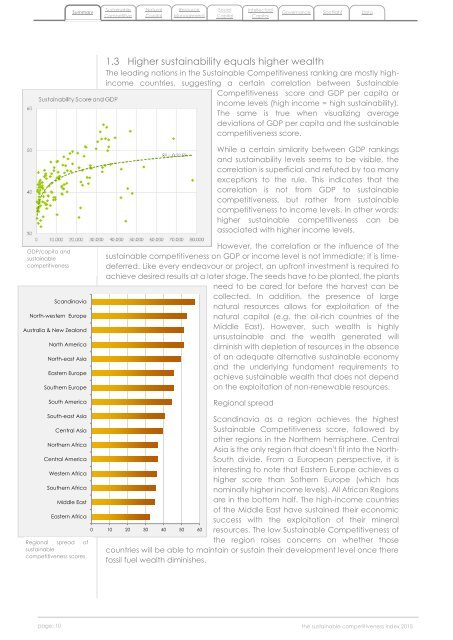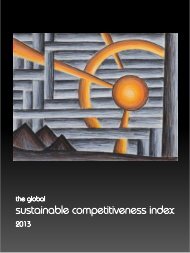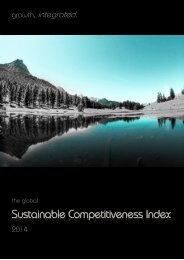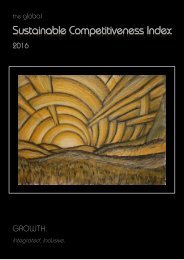The-Global-Sustainable-Competitiveness-Index-2015
You also want an ePaper? Increase the reach of your titles
YUMPU automatically turns print PDFs into web optimized ePapers that Google loves.
Summary<br />
<strong>Sustainable</strong><br />
Competitive<br />
Natural<br />
Capital<br />
Resource<br />
Management<br />
Social<br />
Capital<br />
Intellectual<br />
Capital<br />
Governance<br />
Spotlight<br />
Data<br />
1.3 Higher sustainability equals higher wealth<br />
<strong>The</strong> leading nations in the <strong>Sustainable</strong> <strong>Competitiveness</strong> ranking are mostly highincome<br />
countries, suggesting a certain correlation between <strong>Sustainable</strong><br />
<strong>Competitiveness</strong> score and GDP per capita or<br />
income levels (high income = high sustainability).<br />
<strong>The</strong> same is true when visualizing average<br />
deviations of GDP per capita and the sustainable<br />
competitiveness score.<br />
While a certain similarity between GDP rankings<br />
and sustainability levels seems to be visible, the<br />
correlation is superficial and refuted by too many<br />
exceptions to the rule. This indicates that the<br />
correlation is not from GDP to sustainable<br />
competitiveness, but rather from sustainable<br />
competitiveness to income levels. In other words:<br />
higher sustainable competitiveness can be<br />
associated with higher income levels.<br />
GDP/capita and<br />
sustainable<br />
competitiveness<br />
Scandinavia<br />
North-western Europe<br />
Australia & New Zealand<br />
North America<br />
North-east Asia<br />
Eastern Europe<br />
Southern Europe<br />
South America<br />
However, the correlation or the influence of the<br />
sustainable competitiveness on GDP or income level is not immediate; it is timedeferred.<br />
Like every endeavour or project, an upfront investment is required to<br />
achieve desired results at a later stage. <strong>The</strong> seeds have to be planted, the plants<br />
need to be cared for before the harvest can be<br />
collected. In addition, the presence of large<br />
natural resources allows for exploitation of the<br />
natural capital (e.g. the oil-rich countries of the<br />
Middle East). However, such wealth is highly<br />
unsustainable and the wealth generated will<br />
diminish with depletion of resources in the absence<br />
of an adequate alternative sustainable economy<br />
and the underlying fundament requirements to<br />
achieve sustainable wealth that does not depend<br />
on the exploitation of non-renewable resources.<br />
Regional spread<br />
South-east Asia<br />
Central Asia<br />
Northern Africa<br />
Central America<br />
Western Africa<br />
Southern Africa<br />
Middle East<br />
Eastern Africa<br />
Regional spread of<br />
sustainable<br />
competitiveness scores<br />
0 10 20 30 40 50 60<br />
Scandinavia as a region achieves the highest<br />
<strong>Sustainable</strong> <strong>Competitiveness</strong> score, followed by<br />
other regions in the Northern hemisphere. Central<br />
Asia is the only region that doesn't fit into the North-<br />
South divide. From a European perspective, it is<br />
interesting to note that Eastern Europe achieves a<br />
higher score than Sothern Europe (which has<br />
nominally higher income levels). All African Regions<br />
are in the bottom half. <strong>The</strong> high-income countries<br />
of the Middle East have sustained their economic<br />
success with the exploitation of their mineral<br />
resources. <strong>The</strong> low <strong>Sustainable</strong> <strong>Competitiveness</strong> of<br />
the region raises concerns on whether those<br />
countries will be able to maintain or sustain their development level once there<br />
fossil fuel wealth diminishes.<br />
page: 10<br />
the sustainable competitiveness index <strong>2015</strong>








